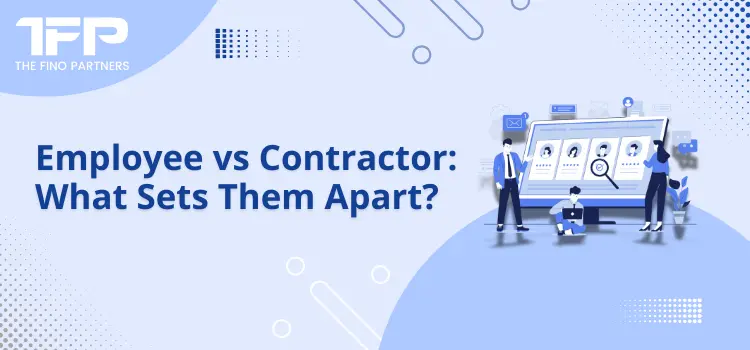Have you ever been grabbed in a chat about work and saw yourself mixing up 'contractors' with 'employees'? It's a little more than job titles. After all, understanding the clear-cut transitions is necessary. Knowing how you're settled/paid is essential—the advantages you're entitled to and those tax bits we all love to dodge. There are various misinterpretations on all sides. Some reckon contractors have the vision gig with all the liberty. But others swear by the guarantee of being an employee.
But beyond the gossip, why should you care? Whether hiring or looking to be hired, getting it wrong can lead to unforeseen hiccups. Miscategorizing an employee as a contractor or vice versa can lead to legal tussles, financial snags, and downright career confusion. Let's explore what truly differentiates the two.
Employee
Walking into a place of work, you've seen folks repeatedly at their desks. After all, they work with a set period. But being an employee goes beyond just punching in and out. Let's explore deeper.
Definition
An employee has a formal agreement to work for an employer. It is in exchange for a regular wage or salary. It’s not just about the paycheck. After all, it is a dedication.
Features
- Regular Periods: While not always the classic 9-to-5, their hours are generally predictable.
- Decided Salary: That monthly paycheck arrives like clockwork with its deductions.
- Employment Advantages: Some advantages involve paid holidays, sick leave, etc. Sometimes, there are small extras like a gym discount, health insurance, etc.
Contractor
Do you know that mate who’s always hopping from one project to another and boasting about setting their hours? That's a contractor for you. Unlike employees, contractors dance to their tune. But it's not all liberty and flexibility. There are other factors, too. Let's explore this.
Definition
A contractor is essentially a self-employed individual. They don't have a permanent employer. Instead, they're hired for specific tasks or a set duration. Once the job's done, they move on, often to various businesses.
Features
- Project-based Work: They're roped in for particular tasks/projects.
- Invoicing: There is no monthly salary. Contractors send invoices for the work.
- Flexibility: Their hours are often more flexible than employees.
Advantages & Legality
But it's not just about the cash. Being an employee or a contractor also influences your rights at work, advantages, and job safety.
Employee Perks
- Statutory Rights: Employees have some rights guaranteed by law. It involves job safety, safeguards against unethical dismissal, etc.
- Advantages: The advantages of being an employee involve sick pay, paid holidays, etc. Sometimes, even bonuses or profit sharing. And let's not forget about that business-sponsored health insurance.
Contractor Independence
- Autonomy: While contractors might not get the conventional job advantages, they have one crucial gift: freedom. They choose when, where, and how they work.
- Potential for More Payment: No middleman means contractors often earn more per job. But, as we mentioned earlier, steady work is not guaranteed work.
- Lack of Traditional Safety: With great freedom comes more risk. Contractors don't have the same job safeguard as employees. So, if a project ends abruptly, they might be left in the lurch.
Winding Up Note
Choosing between being a contractor and an employee is not a decision. It's a choice that figures out your executive journey. It also impacts your work-life balance. After all, it affects your pocket at the end of the month. Businesses, too, need to weigh the advantages and disadvantages. It considers not just immediate needs but also long-term growth.
Let's see how Fino Partners can help you overcome your U.S. business challenges. You can also check how accounting services partner to help you achieve your organization's potential. Contact Fino Partners today to speak with one of our experienced professionals for your business solutions.




























